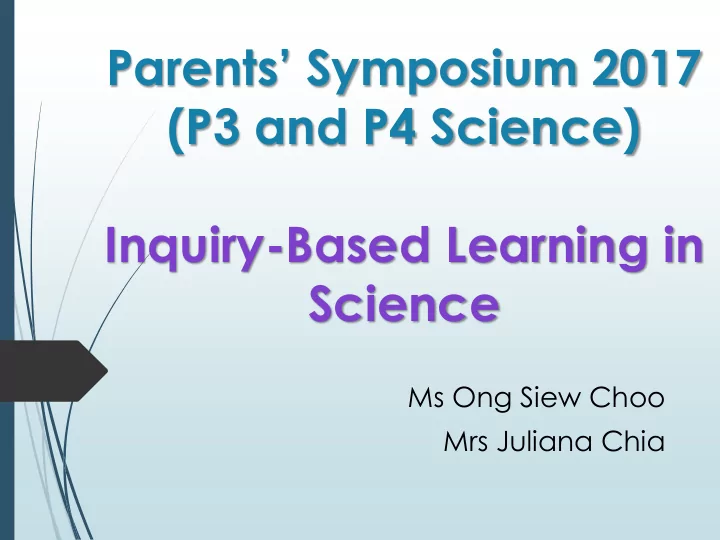

Parents’ Symposium 2017 (P3 and P4 Science) Inquiry-Based Learning in Science Ms Ong Siew Choo Mrs Juliana Chia
Overview of the Primary Science Syllabus Themes Lower Block (P3 & P4) Upper Block (P5 & P6) • Diversity Diversity of living and non-living things • Diversity of materials • • Cycles Cycles of plants and animals Cycles in plants and animals (Life cycles) (Reproduction) • • Cycles in matter and water (Matter) Cycles in matter and water (Water) • • Systems Plant system Plant system (Respiratory and (Plant parts and functions) Circulatory systems) • • Human system Human system (Respiratory and (Digestive system) Circulatory systems) • Cell system • Electrical system • • Interactions Interaction of forces (Magnets) Interaction of forces (Frictional, gravitational forces, force in springs) • Interaction within the environment • • Energy Energy forms and uses Energy forms and uses (Light and Heat) (Photosynthesis) • Energy conversion
An Overview: Big Ideas in Science Syllabus Big Ideas Key Inquiry Questions Diversity What can we find around us? How can we classify the great variety of living and non-living things? Why is it important to maintain diversity? Cycles What makes a cycle? Why are cycles important to life? Systems What is a system? How do parts / systems interact to perform function(s)? Interactions How does Man better understand the environment? What are the consequences of Man’s interactions with the environment? Energy Why is energy important? How is energy used in everyday life? Why is it important to conserve energy?
Curriculum Matters At PSLE, pupils are expected to answer questions comprising : knowledge (with understanding) and application (of knowledge and skills) taught in P3, P4, P5 and P6.
Inquiry-based Learning Inquiry - based learning starts by posing questions, problems or scenarios rather than simply presenting established facts or portraying a smooth path to knowledge. The process is facilitated by the teacher.
Process Skills Engaging with an event, phenomenon or problem through: Formulating hypothesis Generating possibilities Predicting Collecting and presenting evidence through: Observing Using apparatus and equipment Reasoning, making meaning of information and evidence through: Comparing Classifying Inferring Analysing Evaluating Communicating
What are concepts? A scientific concept is a scientific theory or law that explains why and how a natural event or process occurs.
P3 Concepts
P3 Concepts
P4 Concepts
P4 Concepts
Adapted from Diversity Workbook Activity 5.2
Adapted from Cycles Workbook Activity 3.4
Adapted from Energy Workbook Activity 1.4
Adapted from Energy Workbook Activity 2.4
Activity 1 Cut off the bottom of a plastic bottle. Tie a plastic bag over the mouth of the bottle. Push the bottle into a pail of water. Observe what happens. Give an explanation.
Activity 2 Wrap a piece of paper around a metal tin and heat it over a flame as shown below. Explain why the paper did not burn.
Activity 2 video
Activity 3 To put an egg into the bottle that has a neck smaller than the egg using the materials provided, without smashing the egg. Materials: 1) a glass bottle 2) a peeled hard-boiled egg 3) some boiling water 4) a kitchen towel Procedure: 1) Pour the boiling water into the bottle, at least 3 quarters filled. 2) Hold the bottle with the kitchen towel, swirl the water in it and pour it out. 3) Quickly place the egg over the opening of the bottle.
Activity 3 video
Parents as Facilitators Speaking: Scientific Language Doing: Simple hands on experiments Visiting: Zoo, Hort park, Museums Watching: Documentaries Reading: Books, Magazines, Newspapers
Feedback https://tinyurl.com/rmps2017
Recommend
More recommend